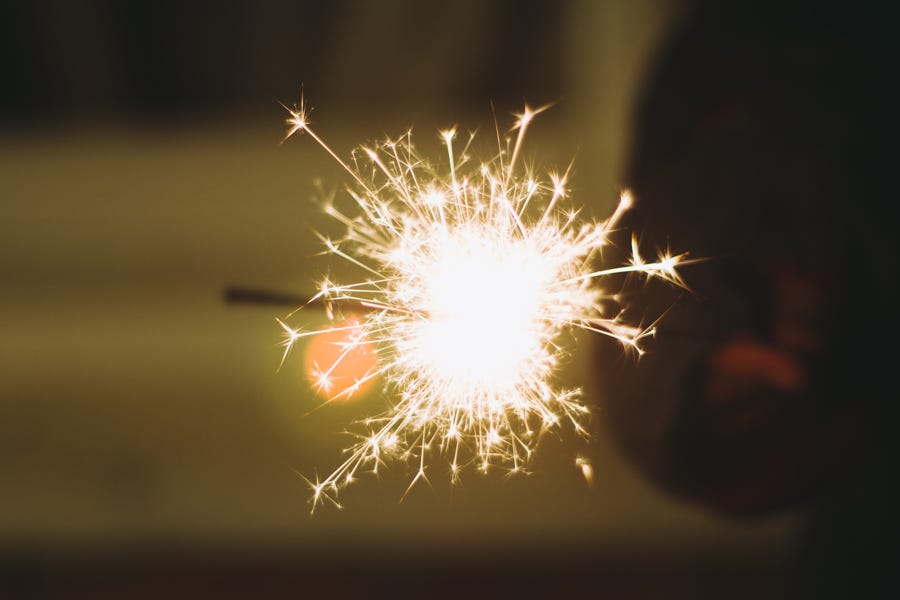sparks
‘They feel things more deeply’, I recall, but perhaps I am thinking of myself.
A scattering of orange sparks float upwards from the bonfire into the sky—to me, their unpredictable, elemental glitter is purer than the showy glow of fireworks. My Granny, Dad tells me, always baked Parkin for Bonfire Night: an oatmeal-dense, syrup-sticky Yorkshire gingerbread best made days before eating and allowed to mature in the tin. I imagine she wrapped it in paper packets tied with string, to be opened with cold fingers and shared beside the fire. The week before her November funeral, I baked trays of Parkin from her recipe in my untidy kitchen. As I stirred, I breathed in spice and searched for words for her eulogy. After the service, in the church basement we drank tea, or something stronger. ‘I haven’t had Parkin in years’, my uncle told me. ‘We always ate it on Bonfire Night, with toffee.’
The sky is clear and blistered with stars as we walk down to the bonfire. My eldest teen has his arm around his girlfriend, and I hear him point out the Big Dipper. The littlest bounces beside me, chatting in the sulphur-scented dark. I carry a clutch of toffee apples for him to share with his friends. ‘You have to make them, Mum’ he said to me that morning, ‘it’s tradition.’ I was tired, and not in the mood for the capriciousness of hot sugar, but I rummaged in my cupboard for demerara and sent him to the greengrocers for apples. I dripped the molten mixture into cold water, waiting for the moment the ribbon hardened and cracked, becoming toffee. Spinning apples in amber, I burned my fingers.
‘Do you remember the first time we took the boys to the bonfire?’ my husband asks me as we weave between high hedges. (We have forgotten, as we do each year, to bring a torch.) It was the autumn after we lost my Granny and the eldest had just started school, his hand small in mine and sticky with toffee, the firelight reflected in his wide eyes. I was pregnant, holding my littlest inside me like a secret. The younger teen was two-years-old then—I carried him in a sling on my back and he slept through the bangs, his head buried in my neck. ‘Can I have money for candyfloss?’ he says now, stomping through the mud in size eleven green wellingtons, his best friends in tow, each of them taller than me. As we arrive at the bonfire, the teenagers melt into the crowd, the younger boys laughing, the eldest and his girlfriend stopping in the shadows to kiss.
Over coffee last week, my friend told me she read that teenagers must pull away, stepping back from us to find out who they are. ‘They feel things more deeply’, I recall, but perhaps I am thinking of myself. Lately, I can’t help counting—we have two more Bonfire Nights together before the eldest leaves home. Three more Christmases…I try not to make the calculations. I try not to think about bobble hats, mittens on elastic, sparklers clutched in tiny fists. A feeling as intense as pain flares again somewhere in my chest. Sharper than sadness, it is closer to grief—the inevitability of love.
As a child, the bonfire my parents took me to in the neighbouring village seemed impossibly huge and thrillingly pagan. Wood crackled loudly, and the shape of leaping flames flickered across a circle of faces—even the few I recognised by the fireside made strange by shadow. It was colder then, my ears and fingers numb. Sparks, burning bright, shot up into the inky night—twisting away from us and rising, free.
spark
NOUN
1
A small fiery particle thrown off from a fire, alight in ashes
2
A small amount of a quality or intense feeling
Thank you for reading,
Laura x




Beautiful writing. Makes me want to snuggle my children close right now.
So good. Thank you for this beautiful piece/lament/love. And fascinating that on the very same you (at Small Stories) and me (at Small Stories about Big Things) - while going in different directions - harnessed the fundamental gift of bonfires/campfires and how they are so much more: https://bobbyhulmelippert.substack.com/p/a-forgotten-glow